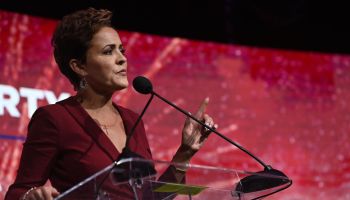Click here to read to full text of the speech, and scroll all the way down this page for video.
NEW YORK — President Barack Obama pushed for stronger oversight on the financial industry and rebuked Wall Street for risky practices Thursday, arguing for “updated, commonsense” regulations to head off any new financial crisis.
Tighter regulations have become Obama’s top priority after the passage of his health care overhaul, and Democrats are hoping to cash in on voter unhappiness over the Bush administration’s bailouts of financial institutions and use it against Republicans in the November congressional election.
Text continues after gallery …
The president acknowledged differences of opinion over how to best protect bailout-weary taxpayers but denounced criticism from some Republicans who claim a Democratic-sponsored bill headed for Senate action would encourage rather than discourage future bailouts of huge banks.
RELATED: Government Accuses Goldman Sachs Of Fraud
“That makes for a good sound bite, but it’s not factually accurate. It is not true,” Obama said to scattered applause. “In fact, the system as it stands — the system as it stands is what led to a series of massive, costly taxpayer bailouts.” He said the overhaul legislation would put a stop to such bailouts.
Obama’s speech at New York’s Cooper Union college came at a delicate time in negotiations over the Senate measure, which could be debated next week. The House has passed its own version of financial overhaul legislation. Obama did not say which one he favored but told an audience that included dozens of financial leaders “both bills represent significant improvement on the flawed rules we have in place today.”
He portrayed his appearance at Cooper Union college, in lower Manhattan, as a reprise of a campaign speech he gave at the same location in March 2008 to offer an agenda for financial regulatory reform.
“Since I last spoke here two years ago, our country has been through a terrible trial,” he said, pointing to the loss of more than 8 million jobs, the losing of “countless small businesses,” trillions of dollars in lost savings and people forced to put off retirement or postpone college.
RELATED: Obama Challenges Wall Street On Anniversary Of Lehman’s Collapse
“I take no satisfaction in noting that my comments have largely been borne out by the events that followed,” Obama said.
Obama’s speech was an effort to ramp up pressure on Congress for legislation imposing new financial regulations.
The sweeping regulation proposal represents the broadest attempt to overhaul the U.S. financial system since the 1930s, and aims to prevent another crisis. Democrats are preparing to bring the Senate version of the bill up for debate, but solid Republican opposition has complicated the effort. Senate negotiators say they had made progress toward a compromise bill that could command support from both sides.
Sponsors still held out hope that the Senate measure would draw some cautious Republican support. At the same time, Senate Majority Leader Harry Reid, a Democrat, told reporters he’s prepared to hold a procedural test vote on Monday if bipartisan negotiations fail to yield an agreement. “The games of stalling are over,” Reid said Thursday.
Obama’s efforts to give the financial bill a personal push toward the finish line drew skepticism from his critics.
“The truth is, the American people have had enough of the federal government,” said House Republican leader John Boehner. He said Obama-backed legislation “will enrich Wall Street at the expense of every other financial institution in the country.”
The U.S. Chamber of Commerce took out full-page ads in New York papers recognizing a need for reforms but criticizing provisions of the current legislation.
The legislation would create a mechanism for liquidating large, interconnected financial firms that are so big that their sudden collapse could shake the economy. At the height of the crisis in 2008, the Bush administration and the Federal Reserve provided billions of taxpayer dollars to prop up the giant insurer American International Group Inc., several banks and various financial institutions considered too big to fail. The moves were highly unpopular with voters.
The bills also, for the first time, would impose oversight on the market for derivatives — complicated financial instruments whose value is derived from the value of other investments. The measures also would create a council to detect threats to the broader financial system and establish a consumer protection agency to police consumers’ dealings with banks and other financial institutions.
Republicans contend that Democratic plans to create a $50 billion fund, paid for by the industry, to help unwind failing institutions would encourage Wall Street banks to take risks and to expect future bailouts. Democrats say the fund would lead to bankruptcy, not rescue. The administration does not support the fund and would not object to its being removed from the bill.
The Senate Agriculture Committee on Wednesday approved a bill to limit banks’ ability to trade derivatives and to make such transactions more open. The proposal is more sweeping than those offered by the Obama administration and the House, but it is expected to become part of the Senate financial overhaul bill.
At the same time, Senate Banking Committee Chairman Chris Dodd, a Democrat, and Sen. Richard Shelby, the panel’s top Republican, have been trying to negotiate a compromise measure that could win Republican support.
Obama’s speech came just six days after the Securities and Exchange Commission’s fraud case against the huge investment bank Goldman Sachs.
Obama has denied any White House involvement in the timing of the SEC case, but the charges have emboldened Democrats in their criticism of Republicans who oppose the administration’s overhaul proposal — even though measures in the proposal may not have stopped the transactions involved in the Goldman case.
Goldman’s CEO, Lloyd Blankfein, was among those in the audience of approximately 700 financial industry leaders, consumer advocates, presidential advisers, local officials, students, faculty and others.
Also there was New York Mayor Michael Bloomberg, who has argued that too much regulation could jeopardize the economy as much as others say tighter regulation would protect it. The industry helps fill New York City’s coffers with millions of dollars in revenue from taxes on Wall Street profits.
Watch video of the speech:















